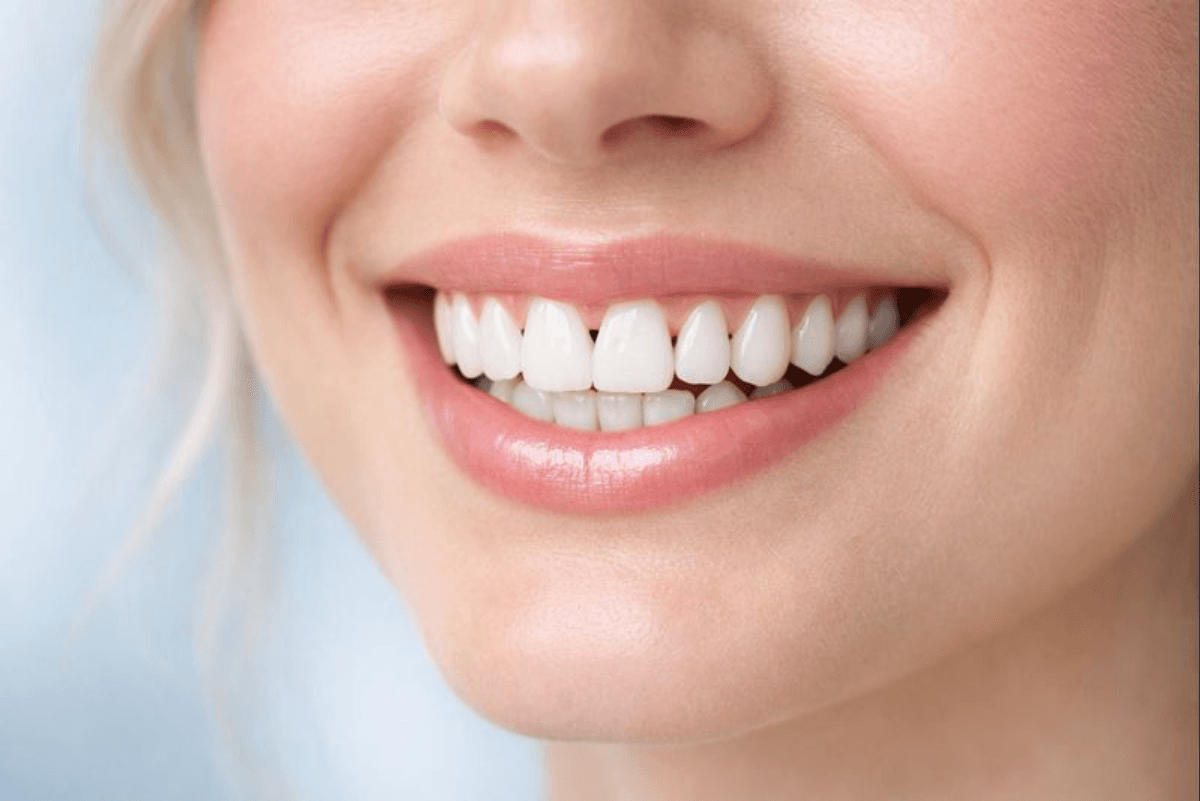Who doesn’t want sparkling white perfect teeth? We understand you can feel self conscious when your teeth don’t look like a movie star’s smile. Instead of hiding your teeth, you may be considering veneers.
Dental veneers can transform the look of your smile and fix multiple cosmetic concerns. Veneers can change the color, shape, size, or length of the teeth that you’re not happy with. They look natural and provide a brighter and more balanced smile. They are also semi-permanent and last 10-15 years We specialize in microthin veneers that require none of your enamel to be removed.

What are dental veneers?
Veneers are wafer-thin shells that are bonded to the front surface of teeth; they are generally made of porcelain or composite resin. Porcelain veneers are stronger and do not stain, they also reflect light as natural teeth do. You can cover just one tooth with a veneer or multiple teeth — the top front 8-10 teeth are the most common for veneer application to achieve the results most people are looking for.
Traditional dental veneers require the dentist to grind down the teeth, taking off some or all of your enamel which can weaken your tooth. This is irreversible. For this reason, Dr. Jennifer Graas is passionate about conserving enamel and spends a lot of time planning cosmetic cases in order to minimize any enamel removal and not do any harm to your teeth. We always work with you to create veneers that have a custom design, color and shape to fit with your goals.
Dr. Jennifer Graas is also the only dentist in Calgary certified to do microthin, no prep veneers. Microthin veneers are non invasive and require no drilling or removal of enamel. They are bonded to the surface of your teeth, taking on the strength of the tooth plus the added layer of porcelain, making them strong and durable. While not everyone is a candidate for this type of procedure, Dr. Graas uses the same concepts of minimally invasive dentistry for all of her cosmetic cases.
Are veneers right for you?
Dental veneers are not right for everyone. Some existing dental issues may not make veneers possible for you. Veneers cannot be applied to teeth with decay or in areas of the mouth with gum disease. If a large portion of a tooth is missing, or has little enamel remaining, you may not be a candidate. Veneers are also not an option for people with excessive crowding, spacing or bite problems that require orthodontic correction first.
Dental veneers can be used to fix a number of dental issues including:
- Worn, uneven or chipped teeth
- Mild discolouration or uneven colouring that can’t be fixed with whitening.
- Unusually shaped teeth or teeth that are smaller than average.
- Closing small gaps between teeth.
How are veneers put in place?
At your appointment, we do an examination to make sure dental veneers are a good choice for your mouth. We look at x-rays to check the health of your teeth, including signs of tooth decay. We will then discuss options for your teeth and how the procedure works.
If veneers are determined to be a fit for you, we take moulds and detailed photographs of your teeth to design your new smile. We then have an appointment where we prepare your teeth and take another special mould, which is sent to a lab for your custom-designed veneers to be made. At the end of this visit we make temporaries which mimic the shape of your final veneers for you to test out.
It takes 2-3 weeks for your veneers to be made, and then you come back to see us to have them placed on your teeth. At this appointment we thoroughly clean your teeth to ensure that no bacteria is trapped under the veneer, and try them in for you to have final approval. We then bond them to your teeth.
How to properly care for your veneers
For some people veneers can be a big change, so we always recommend being careful with eating and chewing at first while you get used to them. Following the procedure, you may experience pain and sensitivity in the area, so keep a painkiller like ibuprofen nearby. Your gums may be sore and your teeth may be cold sensitive for a few weeks, or up to 3 months.
Veneers do not require any special care but there are a few things to keep in mind:
- Treat them like regular teeth! Teeth with veneers can still decay and get cavities, so it’s important to continue to brush and floss your teeth twice daily.
- Watch what you’re chewing on. Veneers can be chipped from biting ice cubes, pens, fingernails, or similar items that are hard. Anything that puts too much pressure on your teeth can also damage a veneer. Be careful while biting or tearing into hard or chewy foods like crusty bread, meat, and beef jerky. Avoid chewing really hard things with your front teeth, it is best to use your back teeth or cut up what you want to eat. And don’t even think about using your teeth to open packaging!
- Get a nightguard. Clenching and grinding can damage your veneers. For this reason we always recommend a nightguard after having veneers placed to protect them and ensure they last as long as possible for you.
- Don’t get your teeth knocked out! If you like playing sports, wear a custom made mouth guard to protect your teeth.
- Don’t use any at home whitening treatments on your veneers: they won’t whiten, and this can damage the porcelain surface.
Let us know if you have any questions or would like to book an appointment with us so that we can thoroughly discuss your options for achieving your perfect smile.



